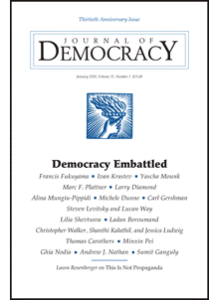Lack of trust creates a vacuum for authoritarian and nativist regimes to take root, according to the World Social Report 2020.
“The central message of populist movements has historically been that the common people are being exploited by a privileged elite, and that radical institutional change is required to avoid such exploitation,” the report adds. But research shows that the history of populist regimes since 1990 has primarily been one of corruption, self-dealing, worsening inequality, and political violence, Ingraham adds.
 Scholars and commentators have long recognized that right-wing parties try, particularly during difficult economic times, to direct the public’s attention to social issues and identities, as opposed to economic issues and class identities. As one study put it, as inequality grew, right-wing parties increasingly sought “to draw voter attention away from interests to values,” Sheri Berman and Maria Snegovaya wrote for the NED’s Journal of Democracy.
Scholars and commentators have long recognized that right-wing parties try, particularly during difficult economic times, to direct the public’s attention to social issues and identities, as opposed to economic issues and class identities. As one study put it, as inequality grew, right-wing parties increasingly sought “to draw voter attention away from interests to values,” Sheri Berman and Maria Snegovaya wrote for the NED’s Journal of Democracy.
Without appropriate policies and institutions in place, inequalities concentrate political influence among those who are already better off, which tends to preserve or even widen opportunity gaps, notes the report from the U.N.’s Department of Economic and Social Affairs:
Growing political influence among the more fortunate erodes trust in the ability of Governments to address the needs of the majority. This lack of trust, in turn, can destabilize political systems and hinder the functioning of democracy. Today, popular discontent is high even in countries that have fully recovered from the 2008 financial and economic crisis and have benefited from steady growth in recent years. RTWT







